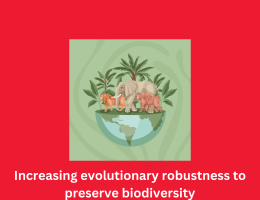
Sexual Selection
- By admin --
- Friday, 24 May, 2024
How Sexual Selection Came To Be Recognized
Charles Darwin proposed that every one residing species were derived from not unusual ancestors. The number one mechanism he proposed to explain this fact turned into natural selection: this is, that organisms better adapted to their surroundings could benefit from higher quotes of survival than those less well ready to do so. However he stated that there have been many examples of elaborate, and apparently non-adaptive, sexual developments that could simply now not aid inside the survival in their bearers. He recommended that such tendencies might evolve if they're sexually decided on, that is in the event that they growth the man or woman's reproductive fulfillment, even on the price of their survival (Darwin 1871).
Which Sex is Under Stronger Selection?
Sex roles are described by using variations in gametes: women produce extraordinarily few, pretty nutritious (usually non-motile) gametes, whereas males produce relatively abundant, smaller, motile gametes. Because only a unmarried gamete of each kind is needed to supply an offspring, there might be an excess of male gametes in an effort to not fertilize any eggs. This asymmetry ends in Bateman's precept, wherein lady duplicate is often limited by their get entry to to resources to nourish and bring those massive gametes, whereas male reproduction is in particular restrained by way of get admission to to women (Bateman 1948). Therefore adult males normally compete amongst themselves for get entry to to females, while girls have a tendency to be choosy and mate best with preferred adult males.
The Role of Parental Care
Most species offer very little care to their offspring, however in species wherein parental care is needed, variance in reproductive success can be impacted now not simplest by means of fertilization achievement, but also with the aid of the contribution of each intercourse to the care of the offspring (Trivers 1972). The diploma and path of sexual dimorphism can be explained with the aid of the relative choice gradients of every intercourse. If ladies provide more parental care than men, the variance in male reproductive fulfillment can be predicted to be large, for the reason that girls presenting offspring care will not be at once to be had for further replica and opposition for available ladies will boom among males. The exaggerated tail of the (male) peacock compared to the shorter tail of the (woman) peahen, shows that men are beneath more potent sexual selection than women (Figure 1a). However, in species wherein biparental care is needed to efficiently enhance offspring, variance in male reproductive achievement is generally lower, considering adult males which might be engaged in offering parental care will now not be capable of make investments as a good deal energy in pursuing extra mating opportunities. This situation often effects inside the emergence of sexually monomorphic species, in which the male and lady appearance and behave in comparable methods (Figure 1b). Finally, in rare conditions where only males offer parental care, men can turn out to be the restricting resource for females. Under these instances, the variance in reproductive achievement can be excessive for women who then generally tend to monopolize get admission to to at least one or more men to care for their offspring. Males might also then become choosy approximately which ladies they mate with. This frequently outcomes in reversed sexual dimorphism, such that women evolve extra intricate secondary sexual characters than males (Figure 1c).
Choosing a Mate
Why do girls pick among men in preference to mate at random, or with the first male they encounter? Females can at once increase their reproductive success by using mating with sure, select adult males and obtaining direct advantages. For instance, females can gain expanded access to food, protection from harassing men, or assist in elevating offspring, and keep away from being infected with parasites or different sicknesses by using selecting healthy adult males. However there are instances where ladies do no longer appear to gain any direct gain from men, yet they still discriminate among them. Under those conditions, women probably gain oblique benefits thru their offspring. These oblique blessings are normally genetic instead of useful resource based totally. By selecting certain adult males, their offspring will in all likelihood inherit genes that tend to boom their health. Males often evolve developments and shows that put it up for sale their ability to offer direct and oblique advantages, and females evolve possibilities for these traits. Two principal mechanisms to account for girl mate preference had been proposed: precise genes, and Fisherian arbitrary procedures.
Fisherian Arbitrary Choice
Named after R. A. Fisher, who at first proposed it, this version shows that female preference can evolve for arbitrary tendencies that do not offer information approximately the male's excellent, and that consequently do no make stronger the outcomes of herbal choice. If women evolve a desire for a specific trait, adult males bearing that trait can be selected as friends. This assortative mating will set up a genetic correlation among the preference and the trait. The fitness gain of the arbitrary trait exists simplest because of its covariance with the desire. By deciding on a male with a particular trait price, the ladies benefit the oblique benefit of producing offspring so one can be more sexually appealing to ladies that deliver the choice (Fisher 1930). This sort of method can result in a runaway tremendous feedback loop, wherein the trait will become more exaggerated as choice at the preference will increase (Fisher 1930), but different models have shown that such a remarks loop is best one of many viable evolutionary effects of the Fisherian procedure (Lande 1981; Kirkpatrick 1982).





